Barometers Spotlight: North/South divide emphasised

There’s a huge range in the fortunes of Farmers Weekly’s Barometer farmers as Andrew Blake checks up on this sodden harvest’ legacy.
SOUTH
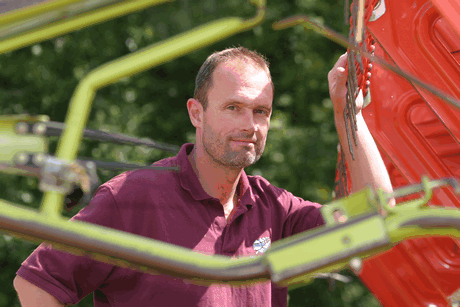
After combining finished on 30 August with some of the best yields ever at East Lenham Farm, near Maidstone, Kent, Andy Barr admits he has been fortunate.
“We’ve been lucky compared with most parts of the country.”
Most wheat came in at 17-19% moisture.
“Drying costs and lower prices will hit our financial performance, but yield-wise it’s the best harvest I’ve ever had.” It included a dried and delivered 8.2t/ha (3.3t/acre) of Tipple spring barley and first wheats averaging 10.8t/ha (4.4t/acre) ex-combine.
“In a calculated risk we’ve drilled nearly 150 acres of rape in much wetter conditions than we would normally, and it’s growing fast. Only time will tell if that was a mistake.
Slugs will be more of a problem after oilseed rape than in it, Mr Barr believes. But provided they can be controlled and the “forced-in” rape survives, his cropping plans stand.
“We already had quite a bit of spring barley planned anyway.”
But the second successive wet summer will slow his drive to more minimum tillage and even direct drilling.
SOUTH WEST
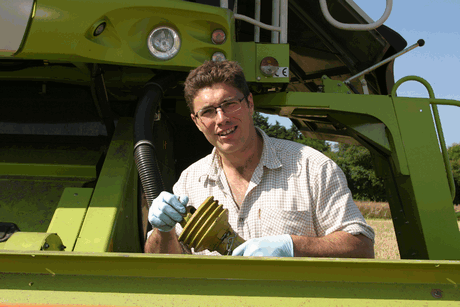
Although combining at North Farm, Horton, Dorset was not complete until 14 September, Peter Snell is pleased with the outcome and foresees little disruption to next season’s plans.
“We like to finish by the end of August,” he said. “But yields have been very good, although bushel weights did diminish towards the end.
“We even had one 22ha field of second wheat giving 15t more than it did last year as a first crop.”
All his thatching straw, for which he expects good demand, is also safely in store.
Much his 70ha (173 acres) of winter oilseed rape was emerged and awaiting its first herbicide last week. “We’ve still got one heavier 22ha field to get in, with hybrid Excalibur, which we’ll probably do straight with the Horsch drill. If we plough we’ll just bring up sticky clay.”
But two applications of slug pellets have already been needed.
“We baled only one field, so there shouldn’t have been too much soil damage. We try not to drill cereals too early, as we find early-October sowings tend to yield better. So I’m in no panic yet.”
EAST
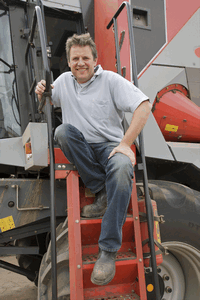
With fieldwork at a standstill for two-and-a-half weeks and 10% of the wheat still to cut at Fleet Farm, West Butterwick, north Lincolnshire, Chris Moore says his patience has been sorely tested.
Nevertheless, he remained philosophical, planning an expanded field drainage programme. “We always do at bit each year. But this time we’re doing 200 acres.
“It’s costing £400/acre, and some people say we’re mad. The whole farm could be under water before too long.” Much uncertainty remained over the government’s commitment to protecting low-lying productive farmland, he said.
“But we must stay positive. Our yields have been OK – Cordiale was exceptional – and, fortunately, we have money in the bank. We’ve never been heavily borrowed.”
Those reserves also provided some buffer against the sliding grain price, he noted.
Whether the 40ha (100 acres) of winter oilseed rape, to replace dropped sugar beet, would get sown remained to be seen.
“I’m trying not to worry too much. If we don’t get the wheat in until the end of October does it really matter? We might even save a bit on aphids and blackgrass control.”
The main cropping change would be to maintain the winter barley at 100ha (250 acres). “We had planned to cut back, as it never yields as much as wheat. But it does usually get you off to a good start with harvest.”
MIDLANDS
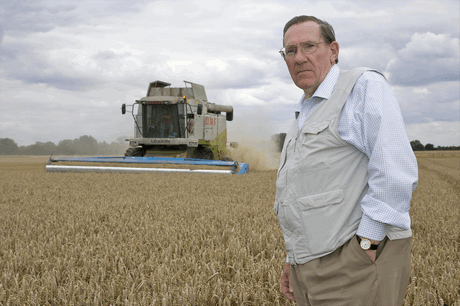
Tony Reynold’s combines were at a halt from 31 August to 11 September because of wet weather, so the autumn workload on land he farms at Thurlby Grange, Bourne, Lincolnshire and near Melton Mowbray, Leicestershire, is well behind schedule.
Most of his 80ha (200 acres) of oilseed rape was “mauled in” in mid-September on land never really dry enough. “My target starting date is 14 August,” he said. “It’s inevitably going to have an effect, and I expect a 20-25% reduction in yield.”
Any land left unsown would revert to spring rape or possibly spring oats or beans, both from home-saved seed, he added. “We have 120 acres of Syncro beans still not ripe, but they look very well.”
The same could not be said about linseed sown for the first time under his no-till system. “We have 120 acres and I expect we shan’t even bother with 60 because it’s all going rotten.”
Of his three no-till drills the new Great Plains machine seemed to be coping with the difficult conditions better than the John Deere and Bertini versions. “It’s performed very well indeed and closes the drill slot better.”
Mr Reynolds hoped the relatively few passes of his new system would minimise the wet summer’s impact on soil structure. “We certainly aren’t seeing the ruts we might have if we were still doing things conventionally.”
WEST
Despite the tricky harvest, plans for Chillington Farm near Wolverhampton, under new manager Simon Collins remain much as passed to him by Andrew Blenkiron.
“Andrew and Jennifer moved to Dorset last week leaving me to my own devices after a two-week handover,” said Mr Collins. “I’d like to thank them for welcoming us to Chillington and for the state in which it was left.
“We’ve resurrected a purchase of Andrew’s, a 13ft cut Clayson/New Holland 8060, the ‘Chillington Rainmaster’, which saved last year’s rape and is doing the same this year in some wetter fields.”
Just 24ha (60 acres) of beans should be left to cut by now, though the farm’s two mobile driers had strained to dry wheat at up to 28% moisture with sprouted grains in Alchemy and especially Oakley.
Nearly all 104ha (257 acres) of oilseed rape are sown. “I’ll try to get the last 11ha in before the end of September, as our agronomist assures me it’s OK until then. We’ve even managed to drill Claire wheat on early ploughed fields that drained well.
“We’ll certainly require more seed than budgeted for, as we’ve raised the sowing rate. I also needed more fertiliser, but will hold off buying to make sure we drill what we intend.”
NORTH
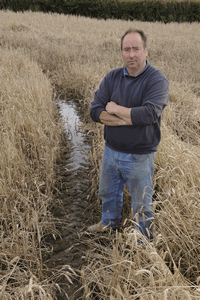
All Ian Bird’s plans for Catchgate Farm, Castle Eden, Co Durham, have been abandoned as he struggles to salvage his wheat harvest frustrated by summer deluges.
“We’ve still got 450 acres of our own to cut, and I’ve lost a lot of contracting work,” he said. “Most of the land is so wet we can’t even plough, and we’ve done no sowing at all.
“I’ve almost lost heart and the will to live. But we’ve got £170,000 worth of wheat still out there, and we have to get it or we won’t grow crops next year.
“Our rotation’s gone out of the window. I’ve ordered some spring beans to replace the 200 acres of oilseed rape, and I’m contemplating 100 acres of spring rape.
“If we ever get the chance we’ll just keep on drilling – even as third and fourth crops and into January and February if needs be – because we already have the seed on the farm.”
SCOTLAND
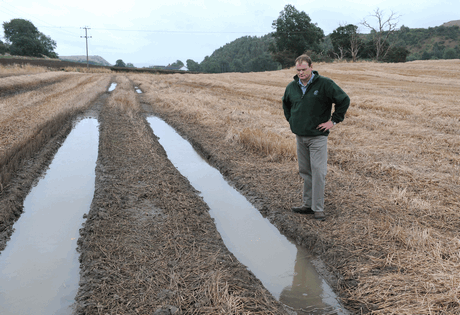
Harvest 2008 at Trinlaymire Farm just to the west of Edinburgh is one that Mike Eagers clearly wants to forget.
“It’s totally disrupted our rotation,” he said contemplating the picture after three days off sick with suspected food poisoning. “We’re just taking it a day at a time.”
Well over half his 810ha (2000 acres) of wheat was still uncut by mid-September, and he was hoping to bring in a third combine. “The quality’s gone – all bushel weights are below 72 – and it’s chitting.
“We’ve drilled 80% of our winter rape, but not where we wanted because we’ve had to go for lighter land. And we’ve attempted winter barley, but got less than 10% in.”
About 10% of the planned wheat area had been sown – by min-tilling. “But the ability to min-till any more has disappeared and we’ll have to revert to a plough-and-power-harrow combination.
“The overtime is going through the roof and I dread to think what the costs are going to be.”
NORTHERN IRELAND
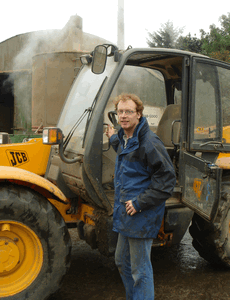
Delayed combining at Dungiven, Co Londonderry, has cast a shadow over James Wray’s autumn sowing.
“We should be lifting potatoes by now, but we can’t do both jobs at the same time,” he said.
“We have 250 acres of potatoes and I’ve doubts about whether we’ll get all the following wheat in on the 170 acres on our own land.”
More grass being converted to arable increased his concern. “We have an extra 60 acres which we ploughed out when we couldn’t go combining.
“We’ll certainly be subsoiling a lot more – not to remedy any soil structure, simply to help surface water drain,” he said.

